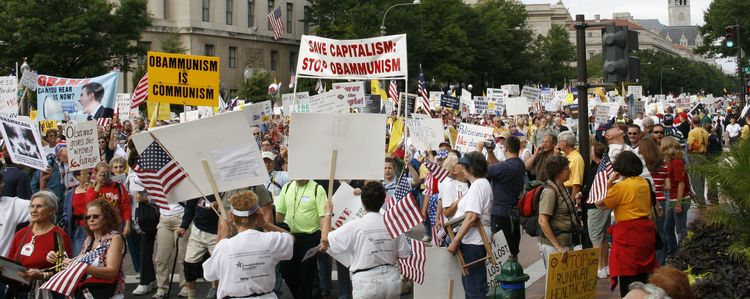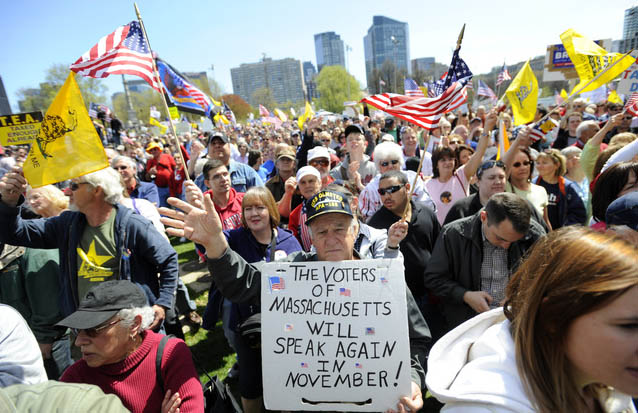
10/30/2013

Tuesday’s poll data was quite a surprise considered from the viewpoint of the efficacy of the propaganda media. The drumbeat Opravda voices have been incessantly insisting the Tea Party to be evil and racist, so any decent showing by the group in polling is worth noting.
Tea Party bashing has become quite the sport for liberals and the uber-left. Earlier this week Sean Penn, Hollywood leftist and pal of commie dictators, suggested on CNN that Obama employ his much-used executive pen to commit Sen. Ted Cruz and other Tea Party members of Congress to an insane asylum.
Congressman Alan Grayson (D-FL) recently sent out a fund-raising mailer comparing Tea Party to the KKK, to much outrage from Republicans but no apology was forthcoming.
The attacks are vicious, and considerably overblown against a citizen group that merely campaigns for Constitutional government and against profligate overspending. The issues are mainstream and widely supported, yet the media gives supportive coverage to far left enemies of the Tea Party.
When George Bush was President, dissent was patriotic, at least according to the liberal press, but now not so much. It’s hard to argue against law and responsible budgets, so the debate has been shifted into emotional areas like inequality and race, with distractions like the Trayvon case taking up truckloads of ink while the debt clock ticked away.
Unlike the violent Occupy movement, the Tea Party represents genuine grassroots American values, which makes it highly threatening to the left.

With all the abuse piled upon them by powerful liberal forces, Tea Partiers have done quite well to poll equal to the President, though the details get a little sketchy. Imagine if the media treated the Tea Party as positively as it did the Occupiers.
42% Identify with Obama Politically, 42% with the Tea Party, Rasmussen Reports, October 29, 2013
Voters are evenly divided when asked whether they agree more politically with President Obama or with the average member of the Tea Party. But an enormous partisan gap colors virtually all opinions of the Tea Party.
A new Rasmussen Reports national telephone survey finds that 42% of Likely U.S. Voters think the president’s views are closest to their own when it comes to the major issues facing the country. But just as many (42%) say their views come closest to those of the average Tea Party member instead. Sixteen percent (16%) are not sure. (To see survey question wording, click here.)
This marks a small setback for the Tea Party from April 2010 when 48% felt closest to the average Tea Party member, while 44% said they had more in common with the president
Thirty-four percent (34%) now believe their personal views are closest to those of the average member of Congress when it comes to the major issues of the day. But slightly more (36%) say their views are closest to those of the average member of the Tea Party. A sizable 30%, however, are not sure.
Opposition by Tea Party Republicans to the president’s national health care law has been blamed for the recent government shutdown, and just 30% of voters now have a favorable opinion of the Tea Party. That’s back to the level seen in January and down from a high of 44% in May after it was disclosed that the Internal Revenue Service was targeting Tea Party and other conservative groups. Fifty percent (50%) regard the small government grass roots movement unfavorably, while 19% are undecided.
But 32% feel the Tea Party has become more influential over the past year, up from 25% in late August before the shutdown began.Twenty-eight percent (28%) say the Tea Party is less influential now. Thirty-three percent (33%) say the group’s influence is about the same.
One-in-three voters (34%) considers the Tea Party movement good for the county, but 43% describe it as bad for America. Thirteen percent (13%) say neither is the case. These findings have changed little since early January.
(Want a free daily e-mail update? If it’s in the news, it’s in our polls). Rasmussen Reports updates are also available on Facebook.
The survey of 1,000 Likely Voters was conducted on October 26-27, 2013 by Rasmussen Reports. The margin of sampling error is +/- 3 percentage points with a 95% level of confidence. Field work for all Rasmussen Reports surveys is conducted by Pulse Opinion Research, LLC. See methodology.
Even prior to the shutdown, voters who approve of the president’s job performance were slightly more likely to consider the Tea Party a bigger terrorist threat to the United States than radical Muslims. At the same time, 78% of Republican voters think it’s important for their party leaders to work with the Tea Party, with 45% who consider it Very Important.
But then 57% of GOP voters have a favorable opinion of the Tea Party movement. Seventy-seven percent (77%) of Democrats and a plurality (47%) of voters not affiliated with either major party view the movement unfavorably.
Sixty-three percent (63%) of Republicans think the Tea Party is good for the country, but 72% of Democrats see it as a bad thing. Among unaffiliated voters, 42% say it’s good for the country, 37% say bad.
When it comes to the major issues facing the nation, 77% of Democrats say Obama’s views are closest to their own. Seventy-six percent (76%) of Republicans and 51% of unaffiliated voters identify more closely with the average member of the Tea Party.
Fifty-nine percent (59%) of voters in the president’s party say the views of the average member of Congress are closest to their own. Sixty-seven percent (67%) of Republicans say the views of the average member of the Tea Party are closest to what they think. Unaffiliated voters are more likely to identify with the Tea Party, but 38% of these voters are undecided.
The partisan gap is a lot narrower when it comes to the influence of the Tea Party these days. Republicans and unaffiliated voters tend to think the movement is more influential, while Democrats are more inclined to see it as less influential.
Overwhelming majorities of Mainstream voters identify more with the average Tea Party member than with either the president or the average member of Congress. Pluralities of the Political Class agree more with Obama and Congress.
Interestingly, while voters are more critical of the Tea Party, they continue to identify with the movement’s smaller government/lower taxes message. Sixty-two percent (62%) think cutting spending rather than increasing it is the best thing the federal government can do to help the economy.
Fifty-four percent (54%) want a long-term federal budget that cuts spending, but 64% think Congress is unlikely to reach such a deal in time to avoid another government shutdown in January.
For the third week in a row, Democrats lead Republicans on the Generic Congressional Ballot. But 47% of voters believe neither party represents the American people.
This is a content archive of VDARE.com, which Letitia James forced off of the Internet using lawfare.